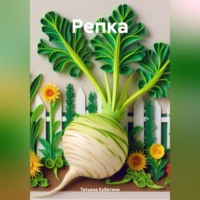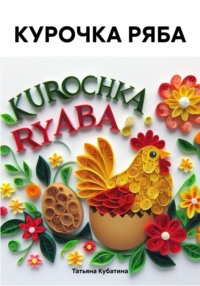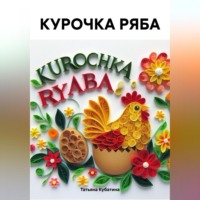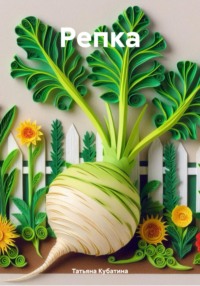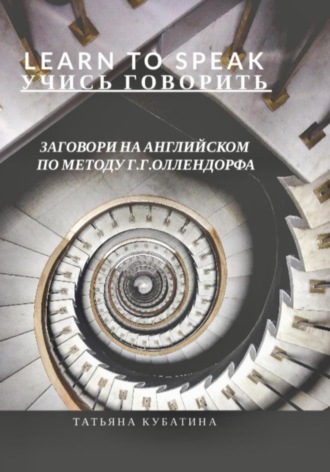
Полная версия
Learn to Speak. Заговори на английском по методу Г.Г.Оллендорфа
The floor
In
Roof
I am big, but my brother is small.
Is the neighbour’s hat big? – It is not (it isn’t) big.
What book does the lawyer have? – The good lawyer has the white book, and the bad lawyer has the black book.
The cat is black, and the dog is also black.
Where is the tailor’s black coat? – It is on the floor.
Where is your brother’s dog? – It is in the garden.
Is he in the garden? – He is not (isn’t) in the garden. – Is he on the roof?
Быть
Я (есть)
Ты (есть)
Он (есть)
Она (есть)
Мы (есть)
Вы (есть)
Они (есть)
Он
Оно
Красный
Жёлтый
Чёрный
Белый
Зеленый
Синий, голубой
Серый
Коричневый
Гвоздика
Киноварь (минерал красного цвета (сернистая ртуть)
Розовый
Тоже, также
Где?
На
Пол
В
Крыша
Я большой, но мой брат маленький.
У соседа шляпа (шапка) большая? – Она не большая.
Какая книга у юриста? – У хорошего юриста есть белая книга, а у плохого юриста книга черная.
Кошка черная, и собака тоже черная.
Где черное пальто портного? – Оно лежит на полу.
Где собака твоего брата? – Она в саду.
Он в саду? – Его нет в саду. – Он на крыше?
EXERCISE 11 – УПРАЖНЕНИЕ 11
What book do you have? – I have the great black book of my father.
Where is your dog? – He is in my neighbour’s garden.
Where is our cat? – Our cat is in our father’s pretty garden.
What cat does the merchant have? – He has the old neighbour’s yellow cat.
Which ribbon do you have? – I have the good red ribbon.
Do you have the white horse? – No, I do not have white horse, but I have the gray horse and the black horse.
Do you have the strong green tea? – No, I do not have it, but I have the good black tea.
What book does the merchant have? – The good old merchant has the red book, and the bad young merchant has the blue book.
Which bread do you have? – I have your brother’s white bread.
Does your husband have my father’s red wine? – No, he does not have it, but he has his son’s green cat.
Which rice do you have? – We have the old merchant’s rice.
Is it good? – It is good and white.
Is your dog black? – My dog is black, and my cat is also black.
LESSON 12 – УРОК 12
The road
The path
The sidewalk
The cape
The top
The rock
Of the
Of the park
Of the grove
Of the orchard
Green
The field
The fields are green
Cold
Warm
The sand
The kitchen-garden
The river
The torrent
The pond
The ditch
The shore
The bank
Deep
Rapid
Shallow
Low
Steep
Thin
Are the countrymen’s fields cold? – They are not cold; they are warm and green.
The river is rapid, and the banks are steep.
Дорога
Путь
Тротуар
Мыс
Вершина
Скала
Из
Из парка
Из рощи
Из фруктового сада
Зеленый
Поле
Поля зеленые
Холодный
Теплый
Песок
Огород
Река
Поток
Пруд
Канава
Берег
Берег (реки)
Глубокий
Быстрый
Мелкий
Низкий
Крутой
Тонкий
Фермерские поля холодные? – Они не холодные; они теплые и зеленые.
Река бурная, берега обрывистые.
EXERCISE 12 – УПРАЖНЕНИЕ 12
Are the fields green? – No, they are not green, they are yellow and blue.
Which fields are green? – Our neighbour’s fields are green, but my father’s are also green.
Do you have the hay of the orchards? – No, I do not have it.
What sidewalks do you have in your gardens? – I have good sidewalks and good paths.
Your torrent is rapid, and your banks are steep.
The pond is large and deep, and the ditch is wide and long.
Is the sand in your kitchen-garden good? – It is not good, but it is not bad.
Which rocks do you have? – I have the blue rocks, the yellow rocks, and the black rocks.
Are your father’s fields cold? – They are not cold, they are warm and green.
Do you have the trees of the groves? – I do not have the trees of the groves, but I have the trees of the parks.
Which ribbon do you have? – I have your husband’s ribbon.
Which ribbon is it? – It is the yellow and green ribbon in the path of my father’s garden.
Are the paths wide? – They are wide and large.
Which hat do you have? – I have your father’s vermilion paper hat.
Работая над данным пособием, я обнаружила, что автор оригинального метода исключил, не использовал в своем пособии местоимение 3-го лица, ед. числа, жен. рода. Ни SHE, ни HER в уроках не использовались. Я скорректировала этот момент и включила местоимения жен. рода в данное пособие.
LESSON 13 – УРОК 13
My
Your
His
Her
Our
Your
Their
It
Them
Mine
Yours
His
Hers
Ours
Yours
Theirs
The author
The watchmaker
The admiral
The goldsmith
The editor
The volume
The pencil
The lake
The gulf
The nest
The hair
The horsehair
The marsh
The country
The body
The nose
The palace
The arm
The back
Do we have ours? – No, we have theirs.
Do you have my red shoes? – I have your white shoes.
Do the merchants have their books? – They don’t (do not have).
Мой
Твой
Его
Ее
Наш
Твой
Их
Оно
Им
Мой
Твой
Его
Её
Наш
Твой
Их
Автор
Часовщик
Адмирал
Ювелир
Редактор
Том, книга, обьем
Карандаш
Озеро
Залив
Гнездо
Волосы
Конский волос
Болото
Страна, деревня, сельская местность
Тело
Нос
Дворец
Рука
Спина
Есть ли у нас наши? – Нет, у нас есть их.
У вас есть мои красные туфли? – У меня есть ваши белые туфли.
Есть ли у купцов свои книги? – Не имеют. У них нет.
EXERCISE 13 – УПРАЖНЕНИЕ 13
Does the author have my volume or thine? – He does not have my volume, but he has thine.
Does the goldsmith have anything pretty? – He has nothing pretty but his nose and his hair.
Do you have my white paper? – I have your white paper and your brown paper.
Do you have my hammer? – No, I do not have it.
Do you have his red and black dog? – I do not have his dog, but I have his green cat.
Which pencil does the editor have? – He has his father’s good black pencil.
Which lake is it? – It is the large blue lake in your small park.
What good do we have? – We have nothing good, but we have something handsome and pretty.
What handsome and pretty do you have? – We have the admiral’s handsome nest and the author’s pretty orchards.
Which horses do we have? – We have the admiral’s beautiful horses.
What horses are they? – They are the horses of the duke.
Which orchard is it? – It is their orchard.
Which orchards are they? -They are the green orchards of the sick gentleman.
What beautiful do they have? – They have their beautiful green parks, groves, marshes, and gardens.
LESSON 14 – УРОК 14
The
Of the
The woman
Women
The mother
The daughter
The sister
The aunt
The niece
The candle
The bottle
The lock
The key
She
They
My
Your
Her
Our mothers
Our fathers
Or
The pear
The nut
The plum
The cherry
The razor
The sword
The nail
The hook
The father and his son or his daughter
The mother and her son or her daughter
Does the mother have her son’s gold key? – No, she has her daughter’s silver key.
Does she have?
Does she have the golden key? – No, she has the silver key and the iron lock.
Определенный артикль
Из
Женщина
Женщины
Мать
Дочь
Сестра
Тетя
Племянница
Свеча
Бутылка
Замок
Ключ
Она
Они
Мой
Твой
Ее
Наши мамы
Наши отцы
Или
Груша
Орех
Слива
Вишня
Бритва
Меч
Гвоздь
Крючок
Отец и его сын или его дочь
Мать и ее сын или ее дочь
Есть ли у матери золотой ключик сына? – Нет, у нее есть серебряный ключик дочери.
Есть ли у нее?
Есть ли у нее золотой ключик? – Нет, у нее есть серебряный ключ и железный замок.
EXERCISE 14 – УПРАЖНЕНИЕ 14
Which pear do you have? – I have your good aunt’s green pear.
Do you have my sister’s small copper key? – No, I do not have your sister’s small copper key, but I have your daughter’s large iron key.
Which wine do you have? – I have the good red wine and the strong white wine.
Which bread do your women have? – They have the fine brown bread.
Which keys do you have? – I have the keys of the small gold lock.
Do you have my good red pencil, or my bad yellow pencil? – I do not have your good red pencil, but I have your bad yellow pencil and your niece’s blue pencil.
Does the woman have her son’s or her pretty daughter’s gold cherry? – She does not have the gold cherry, but she has the black nut.
Which black nut does she have? – She has the gardener’s black nut and the admiral’s black nut in the count’s garden.
Does your mother have my daughter’s silver poniard, or your son’s niece’s steel award? – No, but she has her father’s daughter’s copper razor.
Do you have my nail or my hook? – I have your nail, but not your hook.
LESSON 15 – УРОК 15
What?
Mine
Your
Her
Ours
Yours
Theirs
A
The young man
The young woman
Pale
Tepid
Dirty
Insipid
Wise
Brave
Bald
Awkward
Cowardly
Rich
Poor
Free
Sombre
Sober
The table
The chair
The house
The carriage
Under
Very
The bird
The cloak
The place
The fire
The jewel
Does the woman have the pear? – She has hers, and you have yours.
Is our neighbour’s poor little cat on the table? – No, it is under the chair.
Are the king’s soldiers brave? – They are very brave.
Does the merchant have the poor countrymen’s beautiful birds? – He does not (doesn’t) have their beautiful birds, but he has their great cloaks.
Что?
Мой
Твой
Ее
Наш
Твой
Их
Неопределенный артикль
Молодой человек
Молодая женщина
Бледный
Прохладный
Грязный
Безвкусный
Мудрый
Храбрый
Лысый
Неловкий
Трусливый
Богатый
Бедный
Свободный
Мрачный
Трезвый
Стол
Кресло
Дом
Карета
Под
Очень
Птица Плащ Место Огонь Драгоценный камень
Есть ли груша у женщины? – У нее есть своя, а у вас своя.
Бедная маленькая кошка нашего соседа лежит на столе? – Нет, она находится под стулом. Храбры ли солдаты короля? – Они очень храбрые. Есть ли у купца красивые птицы бедных фермеров? – У него нет их красивых птиц, но у него есть их прекрасные плащи.
EXERCISE 15 – УПРАЖНЕНИЕ 15
What pear do you have?
Do you have the white, the green, or red pear? – I have the white and the red pear.
What sward does our neighbour’s poor little child have? – He has the golden and silver sword.
Does your sister have a good pear? – She has a very good pear, and her brother also has a good green pear.
Which dog do I have? – You have your good neighbour’s poor little dog.
Do you have the pretty white and yellow birds? – I do not have them.
Which jewels do you have? – I have your good mother’s pretty little jewels.
Does the count have the poor old man beautiful red birds? – He does not have them.
Who has them? – We have them.
Do you have your father’s large blue cloak? – I do not have his large blue cloak; I have his pretty green cloaks.
Конец ознакомительного фрагмента.
Текст предоставлен ООО «Литрес».
Прочитайте эту книгу целиком, купив полную легальную версию на Литрес.
Безопасно оплатить книгу можно банковской картой Visa, MasterCard, Maestro, со счета мобильного телефона, с платежного терминала, в салоне МТС или Связной, через PayPal, WebMoney, Яндекс.Деньги, QIWI Кошелек, бонусными картами или другим удобным Вам способом.


